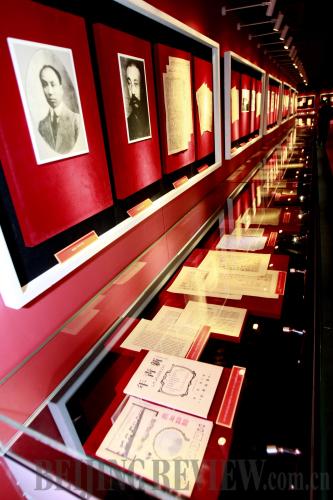|
 |
|
ARCHIVES ON DISPLAY: More than 500 historical records collected by the Central Archives are exhibited in Beijing on June 24 (YANG HUIFENG) |
China is blessed with a long history, and for millenniums the people of China have used history as a mirror to learn from the past. An important part of the country's history, all the archives of the Communist Party of China (CPC) and the Central Government of the People's Republic of China (PRC) are housed in the Central Archives of China, also known as the State Archives Administration.
Tucked away from downtown Beijing's Xicheng District, from the outside the Central Archives looks like any of Beijing's innumerable gray concrete blocks of the 1950s and 60s, but inside the complex of buildings lies a treasure trove of valuable historical information.
"The Central Archives primarily stores documents produced by the CPC before and after the founding of the PRC in 1949, as well as those created by the organs of the Central Government," said Yang Dongquan, Director of the Central Archives. On May 31, Yang welcomed 70 Chinese and foreign reporters to the Central Archives for an open day.
"All the holdings of the Central Archives are official documents with a history of at least 20 years," Yang said. These documents are to be preserved permanently, whereas records of short-term value are stored in the agencies responsible for creating them.
Statistics from the Central Archives indicate as of 2010, it held 1.25 million volumes of records, totaling more than 100 million pages, as well as many photographs, magnetic tapes, videotapes and discs.
"The Central Archives has very few records generated by local governments, as they go to local archives," Yang said.
"Archives play an important role in recording history, advising the government, safeguarding national interests and educating people," Yang said.
Yang illustrated this point with an example. He said after the CPC's first National Congress in July 1921, the meeting's records were lost after the police searched the CPC Central Committee's offices in Shanghai. For a long time much of what transpired in the meeting remained a mystery.
This mystery was solved when, in 1957, the Central Committee of the Communist Party of the Soviet Union returned archived material in their possession that contained six important documents directly related to the CPC's first National Congress. These documents include Russian versions of the Party's first constitution and the resolution adopted by the meeting.
"From archives, government leaders at various levels can know the truth and learn from past experiences so as to improve their governance capacity," Yang said.
The Central Archives proactively provides reference information to top government leaders and relevant government departments.
For instance, after the 8.0-magnitude Wenchuan earthquake in southwest China's Sichuan Province in May 2008, researchers at the Central Archives searched and compiled materials on earthquake relief and reconstruction, and gave them to state leaders and the disaster relief headquarters.
"Archives also play an important role in upholding national sovereignty and territorial integrity," said Sun Gang, an official of the Central Archives.
"After a riot for 'Tibet independence' broke out in Lhasa, capital of Tibet Autonomous Region, on March 14, 2008, the Central Archives quickly presented historical evidence on its Website that prove Tibet has been an integral part of China for centuries," Sun said.
During the Central Archives' Open Day, staff also showed reporters a copy of a letter written by the 14th Dalai Lama to Mao Zedong, then Chairman of the Central People's Government, in October 1951.
The 14th Dalai Lama said in the letter, "The local government of Tibet as well as the Tibetan monks and laymen unanimously support this agreement, and will actively assist the People's Liberation Army in Tibet to consolidate national defense, drive imperialist influences out of Tibet and safeguard the unification of the territory and the sovereignty of the motherland."
| 